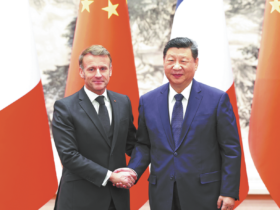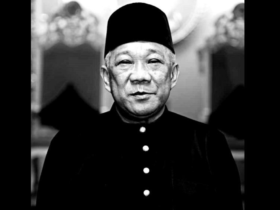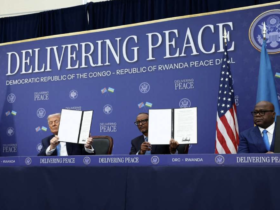HANOI, April 15 (Xinhua) — Chinese president Xi Jinping on Monday called for deepening the building of a China-Vietnam community with a shared future.
Xi made the remarks when meeting with General Secretary of the Communist Party of Vietnam (CPV) Central Committee To Lam during his state visit to Vietnam.
Xi pointed out that he was very pleased to pay a state visit to Vietnam and realize the first round of mutual visits with General Secretary To Lam.
China will, as always, support Vietnam in taking a socialist path that suits its national conditions, successfully holding the 14th National Congress of the CPV in 2026, and its steadfast pursuit of realizing the two goals set for the centenary of the party and the country.
Facing the changing and turbulent world, China and Vietnam have stayed committed to peaceful development and deepened their friendly cooperation, bringing much-needed stability and certainty to the world, Xi said.
A small boat with a lone sail cannot withstand rough seas, Xi said, noting that only by working together in the same boat can they ensure stability and long-term progress.
He noted that both China and Vietnam are beneficiaries of economic globalization, and the two sides should strengthen strategic resolve, jointly oppose unilateralism and bullying practices, and work together to uphold the global free trade system and maintain the stability of industrial and supply chains.
Xi proposed six measures to deepen the building of the China-Vietnam community with a shared future.
First, enhance strategic mutual trust at a higher level.
Leaders of the two parties and countries should communicate with each other as relatives, Xi said, noting the two sides should give full play to the role of channels including inter-party, legislative bodies and political consultative organizations, deepen the exchange of experience in governance, and improve the leadership of the two parties in promoting national modernization.
Second, build a stronger security barrier.
The two sides should set the “3+3” strategic dialogue on diplomacy, defense and public security between the two countries at the ministerial level to enhance strategic coordination.
It is necessary to give full play to the role of defense and law enforcement security cooperation mechanisms, resolutely tackle online gambling, telecom fraud and other cross-border crimes, strengthen bilateral and multilateral law enforcement and judicial cooperation, especially within the framework of the Lancang-Mekong Cooperation, so as to safeguard people’s lives and property and uphold regional peace and stability.
Third, expand higher quality mutually beneficial cooperation.
Seize the major opportunities of China’s new quality productive forces and Vietnam’s new productive forces to accelerate the formation of practical cooperation between the two countries. Realize the comprehensive connection of standard-gauge railways, highways, and smart ports at an early date. Promote high-tech cooperation such as artificial intelligence and the Internet of Things. China’s mega market is always open to Vietnam, and the country welcomes more high-quality Vietnamese products. China encourages its companies to invest in Vietnam and hopes that Vietnam will create a more fair and friendly business environment.
Fourth, tighten the bonds of people-to-people ties.
China and Vietnam should take the China-Vietnam Year of People-to-People Exchanges as an opportunity and organize more people-oriented exchange activities, and enhance cooperation in tourism, culture, media, public health and other fields.
The two sides should continue to explore resources of revolutionary heritage and promote stories of friendship. In the next three years, China will invite Vietnamese youth to China for “Red Study Tours,” which will help the younger generation of both countries better understand the hard-won nature of the socialist countries and the great value of China-Vietnam good-neighborliness and friendly cooperation, and will cultivate greater vitality for the development of bilateral relations and the respective national development endeavors.
Fifth, conduct closer multilateral coordination.
China and Vietnam should jointly uphold the outcomes of World War II, firmly safeguard the international system with the United Nations at its core and the international order based on international law, promote a more equal and orderly multi-polar world and an economic globalization that is more inclusive and beneficial for all, and enhance cooperation under the frameworks of the three major global initiatives.
China will stay committed to the principles of amity, sincerity, mutual benefit and inclusiveness, and to the policy of pursuing friendship and partnership with its neighbors. It will deepen friendly cooperation with neighboring countries so that the fruits of Chinese modernization can better benefit the region.
Sixth, achieve more positive maritime interaction.
The two countries should earnestly implement the consensus reached by leaders of the two countries, properly manage maritime issues, expand maritime cooperation, demonstrate resolve in launching joint development, and work toward the early conclusion of a Code of Conduct in the South China Sea.
Before the talks, To Lam invited Xi to a small-group chat over tea. The two general secretaries exchanged views on party building and national governance. Xi stressed that party building is crucial to the destiny of the party and the country, and that the party’s work style bears on whether it can win public support.
After the talks, the two leaders witnessed the display of 45 bilateral cooperation documents signed by China and Vietnam. These documents cover areas including connectivity, artificial intelligence, customs inspection and quarantine, agricultural trade, culture and sports, public welfare, human resource development, media, and more.


-加码-scaled.jpg)

-加码-scaled.jpg)















Leave a Reply